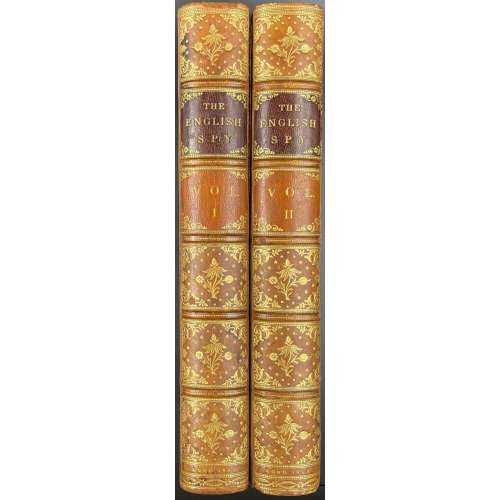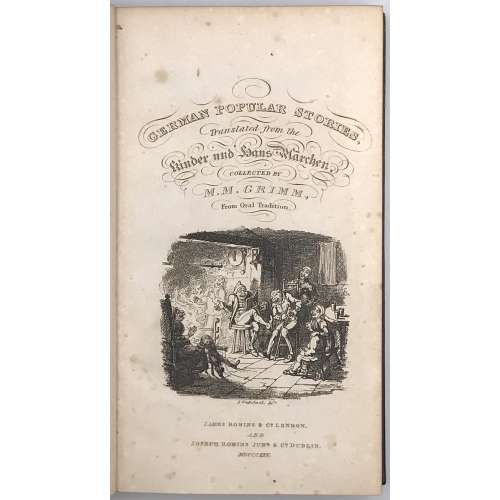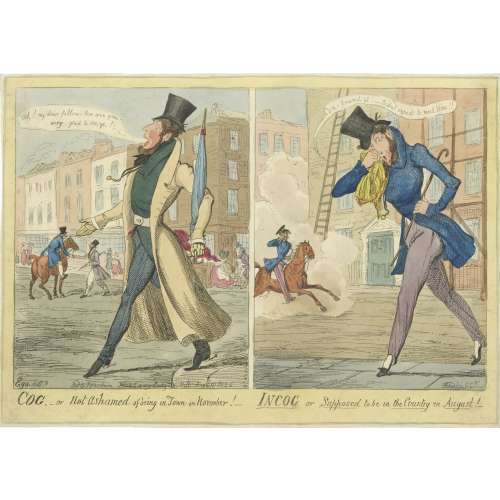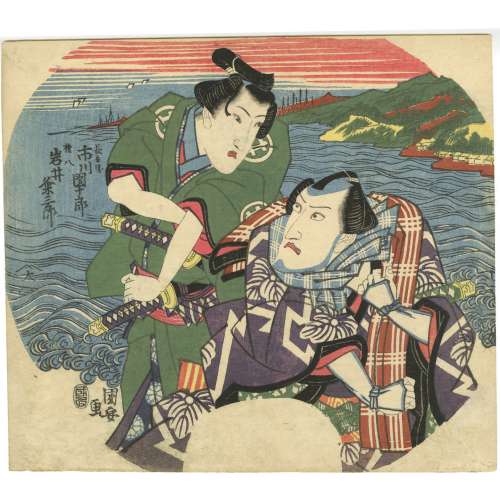-
 Two volumes 23.2 x 15.6 cm, uniformly bound in full polished calf by Riviere and Son (signed on fep verso), boards with triple gilt fillet border, spine with raised bands, gilt in compartments, gilt-lettered labels; dark blue endpapers, armorial bookplate of William Jennings with the motto “Honor Virtutis Premium” to front pastedown. Vol. 1: THE | ENGLISH SPY: | An Original Work | CHARACTERISTIC, SATIRICAL, AND | HUMOROUS. | COMPRISING | SCENES AND SKETCHES IN EVERY RANK OF SOCIETY, | BEING | PORTRAITS | OF THE | Illustrious, Eminent, Eccentric, and Notorious. | DRAWN FROM THE LIFE | BY BERNARD BLACKMANTLE. | THE ILLUSTRATIONS | DESIGNED BY | ROBERT CRUIKSHANK. | {vignette w/inscription: ‘By Frolic, Mirth, and Fancy gay, | Old Father Time is borne away.’ | — | LONDON : | PUBLISHED BY SHERWOOD, JONES, AND CO. | PATERNOSTER-ROW. | – | 1825. || Collation: [a]8 b4 B-H8 I4 K2 L-Z8 2A-2E8 2F3; total 221 leaves Pagination: [i-iii] iv-xxiii [xxiv] [1-3] 4-417 [418]; total 442 pages. Illustrations: 35 coloured plates, 1 uncoloured plate, and 29 woodcuts in text, incl vignette on title, all but four by Robert Cruikshank, 1 by G. M.B rightly (p. 335), 1 by T. Wageman (p. 413), and 2 by T. Rowlandson (pp. 411 and 416) Vol. 2: THE | ENGLISH SPY: | An Original Work | CHARACTERISTIC, SATIRICAL, AND | HUMOROUS. | COMPRISING | SCENES AND SKETCHES IN EVERY RANK OF SOCIETY, | BEING | PORTRAITS | OF THE | Illustrious, Eminent, Eccentric, and Notorious. | DRAWN FROM THE LIFE | BY BERNARD BLACKMANTLE. | THE ILLUSTRATIONS | DESIGNED BY | ROBERT CRUIKSHANK. | — | VOL. II. | — | {vignette w/inscription: ‘By Frolic, Mirth, and Fancy gay, | Old Father Time is borne away.’ | — | LONDON : | PUBLISHED BY SHERWOOD, GILBERT, AND PIPER, | PATERNOSTER-ROW. | – | 1826. || Collation: [A]-Z8 2A-2C8; total 208 leaves. [i-iii] iv-xv [xvi] [1-3] 4-399 [400]; total 416 pages. Illustrations: 36 coloured plates and 25 woodcuts in text. Catalogue raisonné: Martin-Hardie pp. 191-2; Tooley pp. 266-9; Abbey 325, pp.272-4 (see reflections regarding the ‘first issue’). Contributors: Charles Molloy Westmacott (British, c. 1788 – 1868) – author. Isaac Robert Cruikshank (British, 1789 – 1856) – artist, engraver. G. M. Brightly (British, fl. 1809 – 1827) – artist, engraver. Thomas Charles Wageman (British, 1787-1868) – artist, engraver Thomas Rowlandson (British, 1757 – 1827) – artist. Thomas Davison (British, 1794 – 1826) – printer. Sherwood, Jones, and Co. (London) – publisher. Sherwood, Gilbert, and Piper (London) – publisher. William Jennings – provenance
Two volumes 23.2 x 15.6 cm, uniformly bound in full polished calf by Riviere and Son (signed on fep verso), boards with triple gilt fillet border, spine with raised bands, gilt in compartments, gilt-lettered labels; dark blue endpapers, armorial bookplate of William Jennings with the motto “Honor Virtutis Premium” to front pastedown. Vol. 1: THE | ENGLISH SPY: | An Original Work | CHARACTERISTIC, SATIRICAL, AND | HUMOROUS. | COMPRISING | SCENES AND SKETCHES IN EVERY RANK OF SOCIETY, | BEING | PORTRAITS | OF THE | Illustrious, Eminent, Eccentric, and Notorious. | DRAWN FROM THE LIFE | BY BERNARD BLACKMANTLE. | THE ILLUSTRATIONS | DESIGNED BY | ROBERT CRUIKSHANK. | {vignette w/inscription: ‘By Frolic, Mirth, and Fancy gay, | Old Father Time is borne away.’ | — | LONDON : | PUBLISHED BY SHERWOOD, JONES, AND CO. | PATERNOSTER-ROW. | – | 1825. || Collation: [a]8 b4 B-H8 I4 K2 L-Z8 2A-2E8 2F3; total 221 leaves Pagination: [i-iii] iv-xxiii [xxiv] [1-3] 4-417 [418]; total 442 pages. Illustrations: 35 coloured plates, 1 uncoloured plate, and 29 woodcuts in text, incl vignette on title, all but four by Robert Cruikshank, 1 by G. M.B rightly (p. 335), 1 by T. Wageman (p. 413), and 2 by T. Rowlandson (pp. 411 and 416) Vol. 2: THE | ENGLISH SPY: | An Original Work | CHARACTERISTIC, SATIRICAL, AND | HUMOROUS. | COMPRISING | SCENES AND SKETCHES IN EVERY RANK OF SOCIETY, | BEING | PORTRAITS | OF THE | Illustrious, Eminent, Eccentric, and Notorious. | DRAWN FROM THE LIFE | BY BERNARD BLACKMANTLE. | THE ILLUSTRATIONS | DESIGNED BY | ROBERT CRUIKSHANK. | — | VOL. II. | — | {vignette w/inscription: ‘By Frolic, Mirth, and Fancy gay, | Old Father Time is borne away.’ | — | LONDON : | PUBLISHED BY SHERWOOD, GILBERT, AND PIPER, | PATERNOSTER-ROW. | – | 1826. || Collation: [A]-Z8 2A-2C8; total 208 leaves. [i-iii] iv-xv [xvi] [1-3] 4-399 [400]; total 416 pages. Illustrations: 36 coloured plates and 25 woodcuts in text. Catalogue raisonné: Martin-Hardie pp. 191-2; Tooley pp. 266-9; Abbey 325, pp.272-4 (see reflections regarding the ‘first issue’). Contributors: Charles Molloy Westmacott (British, c. 1788 – 1868) – author. Isaac Robert Cruikshank (British, 1789 – 1856) – artist, engraver. G. M. Brightly (British, fl. 1809 – 1827) – artist, engraver. Thomas Charles Wageman (British, 1787-1868) – artist, engraver Thomas Rowlandson (British, 1757 – 1827) – artist. Thomas Davison (British, 1794 – 1826) – printer. Sherwood, Jones, and Co. (London) – publisher. Sherwood, Gilbert, and Piper (London) – publisher. William Jennings – provenance -
 A two-volume set. Volume 1: GERMAN POPULAR STORIES | translated from the | Kinder und Haus Märchen, | COLLECTED BY | M. M. GRIMM, | from oral tradition. | [Vignette] | JAMES ROBINS & Co. LONDON. |AND | JOSEPH ROBINS JUNR & Co. DUBLIN. | MDCCCXXV.|| 12mo, pp. xii, 240; engraved title vignette and 11 plates by George Cruikshank, with a fine proof (?) of the plate illustrating ‘The Jew in the bush’ on India paper laid onto verso of leaf bound between half-title and title. Table of contents: Hans in luck -- The travelling musicians -- The golden bird -- The fisherman and his wife -- The tom-tit and the bear -- The twelve dancing princesses -- Rose-bud -- Tom thumb -- The grateful beasts -- Jorinda and Jorindel -- The waggish musician -- The queen bee -- The dog and the sparrow -- Frederick and Catherine -- The three children of fortune -- King grisly-beard -- The adventures of chanticleer and partlet -- Snow-drop -- The elves and the shoemaker -- The turnip -- Old sultan -- The lady and the lion -- The jew in the bush -- The king of the golden mountain -- The golden goose -- Mrs. fox -- Hansel and Grettel -- The giant with the three golden hairs -- The frog prince -- The fox and the horse -- Rumpel-stilts-kin.; Volume 2: GERMAN POPULAR STORIES | translated from the | Kinder und Haus Märchen, | COLLECTED BY | M. M. GRIMM, | from oral tradition. | [Vignette] | JAMES ROBINS & Co. LONDON. |AND | JOSEPH ROBINS JUNR & Co. DUBLIN. | MDCCCXXVI.|| 12mo, iv, 256, [2]; engraved title vignette and 9 plates by George Cruikshank. Table of contents: The goose-girl -- Faithful John -- The blue light -- Ashputtel -- The young giant and the tailor -- The crows and the soldier -- Pee-wit -- Hans and his wife Grettel -- Cherry, or the frog-bride -- Mother Holle -- The water of life -- Peter the goatherd -- The four clever brothers -- The elfin-grove -- The salad -- The nose -- The five servants -- Cat-skin -- The robber-bridegroom -- The three sluggards -- The seven ravens -- Roland and may-bird -- The mouse, the bird, and the sausage -- The juniper tree. Binding: bound without advertisements in 19th-century brown morocco by Leighton, spines decorated and lettered in gilt, gilt edges, marbled endpapers; armorial bookplates of Thomas Gaisford and Charles Tennant to endpapers. Note: The third edition of vol. 1 (first C. Baldwyn 1823) and the first edition of vol. 2 of the first English translation of Grimm’s Fairy Tales – including Tom Thumb, the Elves and the Shoemaker, Hansel and Grettel, the Frog Prince, and Rumpelstiltskin – with George Cruikshank’s celebrated illustrations. Of Cruikshank’s work, Ruskin remarked, ‘The etchings are the finest things, next to Rembrandt’s, that, as far as I know, has been done since etching was invented. You cannot look at them too much, nor copy them too often’ (The Elements of Drawing, 1857). Provenance: (1) Thomas Gaisford (1779-1855), classical scholar, Regius Professor of Greek at Oxford University, Dean of Christ Church, curator of the Bodleian Library and delegate of the Clarendon Press. (2) Sir Charles Tennant, 1st Baronet (1823-1906), a Scottish industrialist who amassed a notable library and collection of pictures at his Peeblesshire estate, ‘The Glen’. Catalogue raisonné: Albert M. Cohn 369.
A two-volume set. Volume 1: GERMAN POPULAR STORIES | translated from the | Kinder und Haus Märchen, | COLLECTED BY | M. M. GRIMM, | from oral tradition. | [Vignette] | JAMES ROBINS & Co. LONDON. |AND | JOSEPH ROBINS JUNR & Co. DUBLIN. | MDCCCXXV.|| 12mo, pp. xii, 240; engraved title vignette and 11 plates by George Cruikshank, with a fine proof (?) of the plate illustrating ‘The Jew in the bush’ on India paper laid onto verso of leaf bound between half-title and title. Table of contents: Hans in luck -- The travelling musicians -- The golden bird -- The fisherman and his wife -- The tom-tit and the bear -- The twelve dancing princesses -- Rose-bud -- Tom thumb -- The grateful beasts -- Jorinda and Jorindel -- The waggish musician -- The queen bee -- The dog and the sparrow -- Frederick and Catherine -- The three children of fortune -- King grisly-beard -- The adventures of chanticleer and partlet -- Snow-drop -- The elves and the shoemaker -- The turnip -- Old sultan -- The lady and the lion -- The jew in the bush -- The king of the golden mountain -- The golden goose -- Mrs. fox -- Hansel and Grettel -- The giant with the three golden hairs -- The frog prince -- The fox and the horse -- Rumpel-stilts-kin.; Volume 2: GERMAN POPULAR STORIES | translated from the | Kinder und Haus Märchen, | COLLECTED BY | M. M. GRIMM, | from oral tradition. | [Vignette] | JAMES ROBINS & Co. LONDON. |AND | JOSEPH ROBINS JUNR & Co. DUBLIN. | MDCCCXXVI.|| 12mo, iv, 256, [2]; engraved title vignette and 9 plates by George Cruikshank. Table of contents: The goose-girl -- Faithful John -- The blue light -- Ashputtel -- The young giant and the tailor -- The crows and the soldier -- Pee-wit -- Hans and his wife Grettel -- Cherry, or the frog-bride -- Mother Holle -- The water of life -- Peter the goatherd -- The four clever brothers -- The elfin-grove -- The salad -- The nose -- The five servants -- Cat-skin -- The robber-bridegroom -- The three sluggards -- The seven ravens -- Roland and may-bird -- The mouse, the bird, and the sausage -- The juniper tree. Binding: bound without advertisements in 19th-century brown morocco by Leighton, spines decorated and lettered in gilt, gilt edges, marbled endpapers; armorial bookplates of Thomas Gaisford and Charles Tennant to endpapers. Note: The third edition of vol. 1 (first C. Baldwyn 1823) and the first edition of vol. 2 of the first English translation of Grimm’s Fairy Tales – including Tom Thumb, the Elves and the Shoemaker, Hansel and Grettel, the Frog Prince, and Rumpelstiltskin – with George Cruikshank’s celebrated illustrations. Of Cruikshank’s work, Ruskin remarked, ‘The etchings are the finest things, next to Rembrandt’s, that, as far as I know, has been done since etching was invented. You cannot look at them too much, nor copy them too often’ (The Elements of Drawing, 1857). Provenance: (1) Thomas Gaisford (1779-1855), classical scholar, Regius Professor of Greek at Oxford University, Dean of Christ Church, curator of the Bodleian Library and delegate of the Clarendon Press. (2) Sir Charles Tennant, 1st Baronet (1823-1906), a Scottish industrialist who amassed a notable library and collection of pictures at his Peeblesshire estate, ‘The Glen’. Catalogue raisonné: Albert M. Cohn 369. -
 Description by British Museum (1865,1111.2128): "Two designs, side by side. [1] A dandy (probably a portrait), florid, whiskered, and bearded, steps jauntily from the pavement, hand extended, saying: Ah! my dear fellow — How are you? Devilish glad to see ye!— He holds a closed umbrella, ferrule erect, and wears a long tight-waisted coat to the heels, unbuttoned, tight pantaloons and spurred boots. In the middle distance, another dandy grasps the hand of a friend on horseback. Behind are houses with shop-fronts. A man raises his hat to a lady who curtseys. [2] The same dandy steps from the roadway onto the pavement, his handkerchief to his nose; he stoops, trying to conceal himself from a dandy cantering past in a cloud of dust, his eye-glass to his eye. He is without gloves, extraordinary for a dandy, and his trousers are strapped over pumps; he says: Con-found it! — Didn't expect to meet Him!! The street is otherwise empty; against the (large) houses are scaffolding and a tall ladder." Lettered with title, text within image including production details: 'Ego. delt / Etched by G. Ck / Pubd by J Fairburn Broadway Ludgate Hill August 18 1826'. Dimensions: Sheet: 25.5 x 36 cm, Image: 21.7 x 33.8 cm. Catalogue raisonné: A. M. Cohn (1924): № 1001, p. 262.: "A wretched plate. Difficult to believe G. C. had anything to do with it." — Bruton. Value.— £1.
Description by British Museum (1865,1111.2128): "Two designs, side by side. [1] A dandy (probably a portrait), florid, whiskered, and bearded, steps jauntily from the pavement, hand extended, saying: Ah! my dear fellow — How are you? Devilish glad to see ye!— He holds a closed umbrella, ferrule erect, and wears a long tight-waisted coat to the heels, unbuttoned, tight pantaloons and spurred boots. In the middle distance, another dandy grasps the hand of a friend on horseback. Behind are houses with shop-fronts. A man raises his hat to a lady who curtseys. [2] The same dandy steps from the roadway onto the pavement, his handkerchief to his nose; he stoops, trying to conceal himself from a dandy cantering past in a cloud of dust, his eye-glass to his eye. He is without gloves, extraordinary for a dandy, and his trousers are strapped over pumps; he says: Con-found it! — Didn't expect to meet Him!! The street is otherwise empty; against the (large) houses are scaffolding and a tall ladder." Lettered with title, text within image including production details: 'Ego. delt / Etched by G. Ck / Pubd by J Fairburn Broadway Ludgate Hill August 18 1826'. Dimensions: Sheet: 25.5 x 36 cm, Image: 21.7 x 33.8 cm. Catalogue raisonné: A. M. Cohn (1924): № 1001, p. 262.: "A wretched plate. Difficult to believe G. C. had anything to do with it." — Bruton. Value.— £1. -
 Artist: Utagawa Kuniyasu [歌川 国安] (Japanese, 1794–1832). Publisher seal: [太] (Ta): Marks 02-050 | U421b: An unknown publisher in Edo, fl. c. 1815-61; name assigned according to seal shape “Yama-Ta“. Signed: Kuniyasu ga [国安 画]. Date-aratame seal: Bunsei 9 (1826). Actors: Iwai Hanshirō VI [岩井半四郎] (Japanese, 1799 – 1836), other names: Iwai Hanshirō VI, Iwai Kumesaburō II, Iwai Hisajirō I, Baiga (poetry name), Shūka (poetry name) — as Shirai Gonpachi [白井權八]. Ichikawa Danjūrō VII 市川団十郎 (Japanese, 1791 – 1859), other names: Ichikawa Ebizō V, Ichikawa Hakuen II, Ichikawa Shinnosuke I — as Banzui Chōbei [幡随長兵衛]. Kabuki play: Suzugamori [Suzu-ga-Mori, 鈴ヶ森], a.k.a. Ukiyozuka Hiyoku no Inazuma written by Tsuruya Nanboku IV (Japanese, c. 1755 – 1829). First staged in 1823 at Ichimura-za [市村座] in Edo. Plot: "A gang of evil palanquin bearers are stationed near the Suzugamori execution grounds, where they lay in wait to rob travellers passing through. Gonpachi, who killed a man in his home province, is being sought by the police. He is fleeing to Edo when the bearers attack him in hopes of claiming a reward. He beats them off with great skill. Banzui Chōbei, who is being carried by in a palanquin, sees the attack, admires Gonpachi's ability, and promises to aid him if he is going to Edo". [Samuel L. Leiter. Historical Dictionary of Japanese Traditional Theatre. — Rowman & Littlefield, 2014; p. 382-3.; LIB-2110.2019]. Ref.: Sotheby's.
Artist: Utagawa Kuniyasu [歌川 国安] (Japanese, 1794–1832). Publisher seal: [太] (Ta): Marks 02-050 | U421b: An unknown publisher in Edo, fl. c. 1815-61; name assigned according to seal shape “Yama-Ta“. Signed: Kuniyasu ga [国安 画]. Date-aratame seal: Bunsei 9 (1826). Actors: Iwai Hanshirō VI [岩井半四郎] (Japanese, 1799 – 1836), other names: Iwai Hanshirō VI, Iwai Kumesaburō II, Iwai Hisajirō I, Baiga (poetry name), Shūka (poetry name) — as Shirai Gonpachi [白井權八]. Ichikawa Danjūrō VII 市川団十郎 (Japanese, 1791 – 1859), other names: Ichikawa Ebizō V, Ichikawa Hakuen II, Ichikawa Shinnosuke I — as Banzui Chōbei [幡随長兵衛]. Kabuki play: Suzugamori [Suzu-ga-Mori, 鈴ヶ森], a.k.a. Ukiyozuka Hiyoku no Inazuma written by Tsuruya Nanboku IV (Japanese, c. 1755 – 1829). First staged in 1823 at Ichimura-za [市村座] in Edo. Plot: "A gang of evil palanquin bearers are stationed near the Suzugamori execution grounds, where they lay in wait to rob travellers passing through. Gonpachi, who killed a man in his home province, is being sought by the police. He is fleeing to Edo when the bearers attack him in hopes of claiming a reward. He beats them off with great skill. Banzui Chōbei, who is being carried by in a palanquin, sees the attack, admires Gonpachi's ability, and promises to aid him if he is going to Edo". [Samuel L. Leiter. Historical Dictionary of Japanese Traditional Theatre. — Rowman & Littlefield, 2014; p. 382-3.; LIB-2110.2019]. Ref.: Sotheby's.


